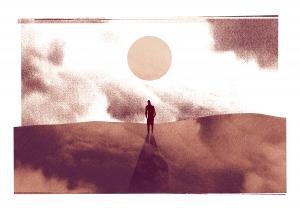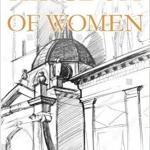Where does spirit come from? From God ultimately, of course, but I mean, in the world where it works on us. Where does it come from?
The Gospel reading seems to make it pretty plain that it comes from the desert:
As it is written in Isaiah the prophet:
Behold, I am sending my messenger ahead of you;
he will prepare your way.
A voice of one crying out in the desert:
“Prepare the way of the Lord,
make straight his paths.”
John the Baptist appeared in the desert
proclaiming a baptism of repentance for the forgiveness of sins.
The Gospel reading for this Sunday ends before Jesus himself appears, but again, when he does, the desert looms large–but in reverse. Instead of coming from the desert, once he is baptized by John, Jesus goes there.
Or rather–he is driven there:
At once the Spirit drove him out into the desert, and he remained in the desert for forty days, tempted by Satan. He was among wild beasts, and the angels ministered to him.
The Spirit drove him out into the desert. I’ve always been struck by this.There is an irresistible image here of Jesus literally being driven, as if by high winds, off the beaten path, on his way to where God wants him to be; and of all the images of the spirit from the Gospels this one gives me the most hope.
And what’s in the desert? More wind. Raw and unending. More spirit.
I’m no longer sure I believe in the immortality of the soul. That is, in the Platonic idea of an anima that survives the death of the body. It always seemed anthropomorphic, and too uncritically projects our human subjective sense of now, our local subjective timeline, over the vastness of the universe. Aristotle had it over Plato here, I think. The soul can be thought of as the form of the body, but it ceases to exist with the death of the body (And I suspect that even Aquinas knew his attempt to counter this argument was weak.)
The ancient Hebrews knew little of Plato. They brought God to the whole world without ever thinking there was something in it for them personally once they were dead.
Why do we?
After all, as the Credo reminds us, we have the promise of resurrection–a physical, spiritual resurrection. And not just of our own bodies–but the entire cosmos, the whole shebang as Timothy Ferris called it in his delightful book of the same name.
So, I’m trying to look at the physicality of spirit, as it works in the world–and has worked since the beginning–and see there the glimpse of what Jesus and God have always meant about life and ultimately resurrection.
It’s inescapably physical.
Go back to that passage: the spirit was something Jesus could feel. It was the wind, of course, but it is also something more. The Hebrew and Greek words for spirit derive from breath.
And then consider, the later conversation of Jesus with Nicodemus in the Gospel of John (3:8), where he fleshes it out even more concretely.
“The wind blows where it will, and you hear the sound of it, but you know not whence it comes or whither it goes; so it is with that which is born of the Spirit.”
There’s something beautifully Darwinian in the randomness of this desert wind, this spirit. But there is also the real and comforting sense that it has been with the world since the very beginning.
Teilhard de Chardin was onto this, in his own personal way, and of all people, Josef Ratzinger seems to have correctly intuited what Teilhard was aiming at with his evolutionary view of the cosmos. Seeing in the history of matter–a prehistory of spirit.
Let’s return to John the Baptist–with his stinking shirt, his face probably a bit smirched with dried honey crusted around his bearded lips. And his insistence on bathing every sinner …with water.
The first of the sacraments: requiring water– counterintuitively came out of the desert with him.
But I think ultimately it all started with the breath; the breath that began to move through the expanding universe from the beginning. It passed through the birth of stars, the emergence of galaxies, the seeding of planets, and drove the evolution of life here. There has never been a time without this physical manifestation of the spirit.
And it still moves across us every day. Every time you step outside to a field, stop on a hill or mountain, or linger by a lake or the sea, any place where the spirit can be felt moving across the landscape. It moves in us, too. It dwells in us.
The kingdom of heaven is upon you. Jesus said it over and over. The kingdom of heaven is upon you. Like a desert wind. Like God’s breath.
There’s something comforting about knowing that even when we’re buried the breath will flow over us, in our ‘small model of the barren earth which serves as paste and cover to our bones,’ as Shakespeare said. Even when the earth is nothing but a dried cinder after the expanding and contracting sun evaporates its mantle of life, the cosmic breath will still blow over it, sustain our global grave–until God makes it all new.
*****

















